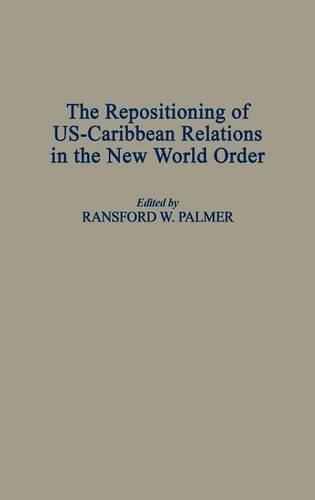
The Repositioning of US-Caribbean Relations in the New World Order
(Hardback)
Publishing Details
The Repositioning of US-Caribbean Relations in the New World Order
By (Author) Ransford Palmer
Bloomsbury Publishing PLC
Praeger Publishers Inc
30th October 1997
United States
Classifications
Tertiary Education
Non Fiction
International relations
337.730729
Physical Properties
Hardback
232
Description
The United States has long dominated economic as well as political affairs in the Caribbean. Recently, however, the relations between the US and the Caribbean nations have been changing. In the early 1980s, the United States unilaterally announced the Caribbean Basin Initiative, which was a set of tariff concessions to the region designed to improve the overall economic situation. More recently, the Association of Caribbean States was created to bring together the islands and countries on the Caribbean rim in an attempt to reposition the region in light of the development of powerful trading blocs in the western hemisphere and Europe. This volume brings together essays that explore the historical, political, and economic dimensions of US-Caribbean relations. As such, it will be of considerable use to scholars and researchers of the Caribbean, economic development, and international relations. This volume brings together essays that explore the historical, political, and economic dimensions of US-Caribbean relations. As such, it will be of considerable use to scholars and researchers of the Caribbean, economic development, and international relations.
Reviews
.,.".beyond the usefulness of the vast amount of economic data presented in the main chapters, the book also offers some thoughtful analyses of the Caribbean's position in the post-Cold War era on issues that continue to be hgihly important in 1998."-The International History Review
.,."a useful and updated volume on contemporary US-Caribbean relations....This volume represents an important contribution to the recent literature and is highly recommended for academic and large public libraries. Appropriate for all levels."-Choice
....beyond the usefulness of the vast amount of economic data presented in the main chapters, the book also offers some thoughtful analyses of the Caribbean's position in the post-Cold War era on issues that continue to be hgihly important in 1998.-The International History Review
...a useful and updated volume on contemporary US-Caribbean relations....This volume represents an important contribution to the recent literature and is highly recommended for academic and large public libraries. Appropriate for all levels.-Choice
[A]ll authors seem to suggest that the crucial test for the Association of Caribbean States rests in its ability to position itself as a major player in giving voice to the concerns of the Caribbean people as NAFTA expands. The present volume permits scholars and policymakers to view the challenges and opportunites that the future holds for the Caribbean.-New West Indian Guide
"All authors seem to suggest that the crucial test for the Association of Caribbean States rests in its ability to position itself as a major player in giving voice to the concerns of the Caribbean people as NAFTA expands. The present volume permits scholars and policymakers to view the challenges and opportunites that the future holds for the Caribbean."-New West Indian Guide
...".beyond the usefulness of the vast amount of economic data presented in the main chapters, the book also offers some thoughtful analyses of the Caribbean's position in the post-Cold War era on issues that continue to be hgihly important in 1998."-The International History Review
..."a useful and updated volume on contemporary US-Caribbean relations....This volume represents an important contribution to the recent literature and is highly recommended for academic and large public libraries. Appropriate for all levels."-Choice
"[A]ll authors seem to suggest that the crucial test for the Association of Caribbean States rests in its ability to position itself as a major player in giving voice to the concerns of the Caribbean people as NAFTA expands. The present volume permits scholars and policymakers to view the challenges and opportunites that the future holds for the Caribbean."-New West Indian Guide
Author Bio
RANSFORD. W. PALMER is Professor of Economics and Chairman of the Department of Economics at Howard University. Among his earlier publications are Pilgrims from the Sun: West Indian Migration to America (1995), In Search of a Better Life: Perspectives on Migration from the Caribbean (Praeger, 1990), and Caribbean Dependence on the United States Economy (Praeger, 1979).
